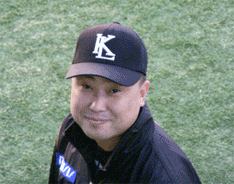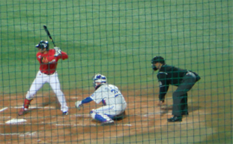Umpiring in Korea
This article was written by John Behrend
This article was published in The SABR Book of Umpires and Umpiring (2017)
Korean umpire Won Hyun-sik. (Author’s collection)
In 2016 there were 46 umpires at the highest professional level in the Korean baseball league.
Most umpires in Korea have either played some type of baseball, in youth leagues, high school, college, or even in amateur ranks, but not many have played professional baseball in Korea with any of the KBO (Korean Baseball Organization) teams.
If you want to become a professional umpire in Korea, playing experience is not a requirement, but it does help. One can join the Korean Baseball Association (KBA), an umpire school run by the KBO. The school lasts about 45 days and anyone can attend — even this author. Those who earn the highest scores can get an opportunity to umpire in the Futures League (low minor-league baseball). If you make the cut, before you can call in the Korean professional league you will have to work at least five years in the Futures League. One umpire, Um Jae-gook, had no prior baseball-playing experience; he passed and joined the KBA/KBO umpires but retired after three years of Futures League ball. As of 2017 he worked as a freelance amateur-league umpire.
Some Korean umpires have attended the two professional umpire schools in the United States, run by former umpires Jim Evans and Hunter Wendelstedt. There are some female umpires in Korea in the amateur ranks and some are very good; one with whom I have worked in umpiring amateur ball is Munsook Jeon. Some have attended the school; some have passed all the requirements but were not eager enough to accept a position.
While the rules of game are the same, umpiring in Korea is unique. One difference is that in the Korean Baseball Organization, umpires work in a five-man crew instead of the standard four-man crew used in the US major leagues. So the rotation is a bit different. The home-plate umpire doesn’t move to third base the next game as in the United States; that umpire sits out the next game and is part of the instant-replay team. Only one umpire from the crew reviews the questioned call while the other three remain on the field. In the United States, of course, the umpire who made the call and the crew chief go to the headphones and are in contact with the umpires making the actual replay calls.
In Korea there is a fifth-inning stretch and the umpires leave the field, returning in about two minutes while the grounds crew drags the field and re-marks the home-plate area. The grounds crew also drags the infield after the third inning.
There is no pregame meeting at home plate. The batting orders of both teams are received by the plate umpire during batting practice. Five minutes before the game, the umpires enter the playing field together and jog straight to their positions on the field, and then the Korean National Anthem is played.
Umpires in the KBO have neither a union nor a retirement system. The retirement age is 57. They are independent contractors, hired from year to year. They are evaluated in listed categories. Plate umpires, for instance are rated on Body Head Positioning, Timing, Judgment/Consistency of Strike Zone, Use of Voice, and Positioning of Plays. All umpires are graded on Communication with Partner(s), and Knowledge of Four-umpire Mechanics system.
Pay for umpires in Korea is very low. Umpires almost went on strike one season for that reason. The starting pay for a rookie umpire is about 20 million won for a season, equal to about $17,590. A 20-year-veteran umpire gets up to 100 million won ($87,950), plus hotel and travel expenses. Because they have no union, if an umpire makes a serious mistake, he may be paid less. After a third serious mistake, he will be demoted to the Futures League. One umpire named Park was demoted in 2015 for making some serious mistakes such as in signaling safe and out and was sent down for six months to the Futures League.
The unusual “gorilla” stance favored by many Korean umpires. (Author’s collection)
Do players give the umpires a hard time in the Korean League? It is probably no different than in the US professional leagues. But sometimes the players can be punished for their actions. In one example from 2014, pitcher Charlie Shirek of the NC Dinos, a team that plays in the city of Changwon on South Korea’s southeast coast, was fined 2 million won and had to perform 40 hours of community service as punishment for swearing at an umpire. He showered abuse on umpire Kim Jun-hee in the first inning of a game against the SK Wyverns. Shirek strongly complained about Kim’s calls on his pitches. Despite repeated warnings from the plate umpire, Shirek continued to swear in both Korean and English and was soon ejected — or, as they say, ordered to leave the pitcher’s mound.
Another odd practice: The pitcher can wear foreign objects attached to his body unless the opposing team appeals to the umpires. If they determine that it neither confuses the hitters nor affects the movement of his pitches, it will be allowed. An example would be the wearing of “health necklaces.” If it doesn’t affect the game and there is no intention to cheat, then it is permissible. The rules also allow taping, jewelry, and so on, quite different from US major-league standards.
Umpires are human, and that is part of the human element of the game. The statement that the best umpires in baseball are the ones the fans don’t know is not necessarily true. Some of us do know their names.
Fans naturally hope for fewer missed calls from umpires. Complaints arose over a series of controversial calls by umpires, many of which were obviously incorrect. The KBO, which had long turned a deaf ear to outcries from fans, players, and coaches, finally decided to expand its replay system, which was not as accurate as that in the US major leagues.
At first, the system was only for home-run calls. The KBO had to amend its rules, which banned challenges to ball/strike, fair/foul, and safe/out calls. Managers can only challenge fair/foul and safe/out calls, or a questionable home-run call. Even this was a drastic change in the stance of the league, which had merely stressed that the umpire’s authority should be respected. During replays, the stadium scoreboards do not show the play, but spectators can see them on their smartphones, even watching frame-by-frame. While the playing rules are universal, Korea illustrates that umpiring varies from country to country in terms of training, compensation, and on-field procedures.
JOHN BEHREND started umpiring when he was 16 after one of the umpires didn’t show up for a high school baseball game, and has been hooked ever since that day in 1963. He says, “I’ve loved the game of baseball ever since I could walk. I played American Legion baseball and in 1965 went to the 40th annual Legion World Series, held in Aberdeen, South Dakota where I had the pleasure of meeting Ted Williams, Bob Feller, and Burleigh Grimes.” Behrend served in the Marine Corps from 1967- 1994, including service in Vietnam in 1968-69 with 3/7 as an infantryman. A resident of South Korea since 1994, he has been member of the ABUA since Jim Evans invited him to join in 2007. John umpires Korean youth leagues and semipro baseball in the amateur league in Korea, selected to umpire in the Asian Pacific Pony Baseball World Series in Seoul, South Korea, July 2016. Three times he has been selected to umpire in the DODEA, Far East NFHS baseball championships held in Korea with 13 teams from the Pacific region, including teams from Korea, Guam, and Japan. He is married and currently living in Daegu, Korea.




